- Home
- Maggie Stiefvater
Call Down the Hawk Page 19
Call Down the Hawk Read online
Page 19
When he said she was a mess, he just meant the vodka and ecstasy.
Retrospectively, Hennessy could see that he liked that J. H. Hennessy was a mess.
“Are you gonna save me?” Hennessy asked the Dark Lady, wiping her face again. The Dark Lady looked at her mistrustfully, pessimistically. “Us, I meant to say. Thanks for straightening that.” The Dark Lady didn’t smile. Neither did Hennessy. She didn’t know how potent The Dark Lady’s power to influence dreams was, but she didn’t think there was a chance in hell it was enough to shift Hennessy’s recurring nightmare. If it hadn’t wavered in sixteen years, it seemed unlikely that it was going to flinch now. Hennessy closed her eyes—there it was. She didn’t even have to close her eyes. She stopped thinking—there it was.
She was so tired.
Judging from the dream creations she woke with, Jay’s dreams seemed straightforward, uncomplicated. She dreamt of what she had been doing while she was awake. She went to a party, she woke with sequins. She got into a fight with Bill Dower, she woke with divorce papers. He lured her back with flowers and jewelry, she woke with more flowers and jewelry. The only thing she’d ever dreamt that interested Hennessy was Hennessy’s ferret, which she’d dreamt the day Hennessy spent all day begging for one.
Cassatt had been a great pet. He didn’t smell and ate nothing except prescription drugs.
Until Jay died and he fell asleep forever.
Curled up on the concrete stairs, Hennessy was starting to feel not good. She could tell her ears were starting to fill with the black stuff. The taste of it was awful.
“I’m gonna do it,” Hennessy told the Dark Lady, who was beginning to judge her for staying awake for so long. Didn’t she care about the other girls? the Dark Lady wondered. Didn’t she care that they were all probably starting to stagger around about now, starting to feel the trickle-down effects of the black ooze bubbling up in their creator? Didn’t she care that if she died, they’d all sleep? Hennessy resented all of this. The girls were basically the only thing she did care about. “I’m just not mad about the idea. Gimme a few to talk myself into it.”
It wasn’t just hatred of the nightmare that kept her awake. As bad as this felt, the way her body felt after she dreamt a copy of herself was worse.
She just didn’t think The Dark Lady was going to save her from that.
Hennessy’s phone buzzed again. She toed it over to see the caller ID. Jordan. So she was done with her date with Declan Lynch. She’d survived, apparently. Hennessy had googled the guy and it looked like Jordan had definitely drawn the shortest out of all possible straws, and that was including the black ooze among the straws. Hennessy would rather bleed out than date a boring white man in last year’s suit.
Jordan texted: The girls said you mistreated them
She hadn’t mistreated them. She’d just taken the newly stolen painting and told them to go spend the rest of their lives doing end-of-the-world things in case this next dreamt copy was the one to kill her. They hadn’t wanted to leave her. She’d repeated the exhortation. Persuasively. Stridently. It’s what she would have wanted. Party right up till the end. No warning. Not much in the way of parties to find at noon on a DC weekday, but surely they could think of something. They were Hennessys.
Jordan: Where are you
This wouldn’t be the copy to kill her anyway, Hennessy thought. Three more. That’s what she thought. Every time she dreamt a copy, a new flower tattoo appeared on her throat, and there was only room for three more.
She wiped some black on the top of her shoe.
“People like me,” Hennessy told the Dark Lady, “were born to die young.”
Which made it basically murder for J. H. Hennessy to have a kid in the first place.
The Dark Lady’s eyes glittered. She thought Hennessy was being melodramatic. Maybe she was. Hennessy shivered and looked out across the water, trying to imagine a dream that had the ocean in it instead of yet another Hennessy.
She couldn’t picture it.
She could only imagine the same dream that was already happening behind all of her thoughts. Over and over and over again.
Jordan texted: You can keep playing silly buggers and I can keep looking for you but it’s boring don’t you think
Oh darling, Hennessy texted back, I don’t think boring is something you and I have to worry about.
Declan Lynch knew he was boring.
He’d worked very hard to be that way, after all. It was a magic trick he didn’t expect any prize from but survival, even as he looked at other lives and imagined them his. He didn’t fool himself. He knew what he was allowed to do and to want and to put in his life.
He knew Jordan Hennessy didn’t belong.
But still, when he came back from the National Gallery of Art to his empty town house, he closed the door behind him and for a moment he just leaned against it, eyes closed, pretending—no, not even pretending. He just didn’t think. For one second of one minute of the day, he didn’t run the probabilities and worst-case scenarios and possibilities and consequences. For one second of one minute of the day, he just let himself feel.
There it was:
Happiness.
Then he let out a deep sigh, and his thoughts came rushing back, and along with them, all the reasons why every relationship before now and after this had to remain disposable.
But joy is a small, tenacious crop, especially in soil that hasn’t grown any for a long time, and so it lingered with him as he checked his watch to see when Matthew was due back from soccer and hung up his coat and his keys and toed off his shoes.
Then he did something he hadn’t had the guts to do since he’d gotten it.
He turned on the light in the kitchen, clucking his tongue when he saw that Matthew or Ronan had tracked grit in from the back door—was it so hard to scuff your feet on the mat if you weren’t going to take off your shoes? He pulled open the closet door and there she was, The Dark Lady.
Before, looking at The Dark Lady had triggered all kinds of complex sensations, most of them shitty.
But today it was just a painting.
He drew it out of the closet and brought it to the dining room table. He set it on its face and looked at the brown backing paper that neatly covered the back of the canvas and sealed the edges of the frame. His eyes glanced off the words Mór Ó Corra and away. Then he retrieved a small, sharp knife from the kitchen.
He hesitated.
You can’t unsee this, he told himself.
This is not allowed in the life you are living, he told himself.
I want so much more, he told himself.
And he neatly sliced the edge of the brown backing paper. He took his time at first, keeping the cut straight and even and surgical, and then the line grew faster and more ragged and furious as he went, until eventually he was tearing it off with his hands, chanting, I hate you, I hate you, I hate you.
Then his fingers were trembling and the paper was removed and he was looking at the back of the canvas.
There was nothing there.
There was nothing there.
There was nothing there.
All of this and there was nothing there.
Nothing there. Ronan had been digging through his father’s belongings for hours and he’d found jack shit.
He had been restless all day. His dreams the night before had been antsy, fractured, Bryde-less. His morning after was antsy, fractured, Adam-less. He spent an hour driving the BMW around and around the muddy skid pad. The growl of the engine was unable to vanquish the thoughts of his father’s youthful face and his mother’s troubled one, Bryde’s compelling voice and Declan’s dampening one.
Declan had told him not to chase the rabbit. Bryde had told him to chase the rabbit.
They were tied, and he was not allowed to be the tie-breaker.
Go slow, Adam had said.
Tomorrow Ronan had to drive back to DC for his birthday. He wasn’t sentimental over it, but Matthew was a big bel
iever in birthdays and ritual, so he’d return for some level of revelry. Matthew had suggested a picnic to Great Falls. Declan had suggested a nice dinner out. Ronan found both options unbearably routine.
Why hadn’t Bryde come to him last night?
He knew, though.
Bryde was done with chasing Ronan; it was Ronan’s turn now.
And he wanted to chase.
Go slow.
Ronan drove up into the mountains to kill some time. He thought about going farther, about driving all the way to Lindenmere, but it wasn’t a good idea to visit the forest in a disordered frame of mind, and Ronan would place his relative disorder at a solid seven on a scale of one to ten. Instead, he returned home, made himself a peanut butter sandwich, and began to tear apart the farmhouse as he had many times before, looking for secrets or dreams he’d overlooked.
Which was when he heard—
Something. An intruder.
An engine fading, possibly. Not right next to the house. That would’ve been louder. This was more like an engine fading halfway down the drive in order for the driver to come the rest of the way without detection.
Or maybe it was nothing.
Surely no one could have made it through his security system.
Outside, Chainsaw called out. It wasn’t her alarmed bark, though, was it? It was just a bark.
He had his little knife filled with talons in his pocket and there was a gun in Declan’s old room.
He heard the back door open.
Fuck.
Of course it wasn’t locked. Not while he was awake, not while the driveway was protected.
A floorboard in the mudroom creaked.
Ronan was on his feet. Silently. He swiftly moved through the house, avoiding the boards he knew would creak and give him away. He had his knife out. He stopped for the gun.
Thud, thud.
That was just his heart, frustratingly loud in his ears.
Downstairs, the living room was empty. So was the sitting room. The dining room.
Another noise. From the kitchen.
Ronan lifted the gun.
“Jesus, Ronan, it’s me!” The kitchen overhead light came on and revealed Adam Parrish, removing a motorcycle helmet. He eyed the gun. “You know how to take a surprise well.”
Ronan remained fixed in place, uncertain. It was not that Adam looked wrong at all—he looked marvelously himself, in fact, his hair matted down from being under the helmet, his shoulders lean and fit in a leather jacket Ronan had not seen him in before, his cheeks bright and heightened from the journey. But after the last two days, Ronan could no longer believe someone’s face as proof of identity.
“How did you get through the driveway?” he asked suspiciously.
“Horribly,” Adam said, rolling the helmet onto the counter and peeling off the jacket and gloves. He threw both next to the helmet and smelled his bare arms. “Is it as bad leaving as it is coming? Because if so I’m staying here forever.”
He turned and realized Ronan was still holding the gun. His brows drew together. He didn’t look upset. He just looked as if he was trying to understand.
Ronan didn’t understand himself, either. Part of his mind was saying, Of course it’s Adam, put the gun down and another part was saying, What is real? He understood why both parts of him existed. What he didn’t understand was how evenly they were matched. He hadn’t realized that seeing his parents’ faces on living bodies had affected him so thoroughly until this moment of seeing someone he loved very much and yet not knowing if he could believe it.
“Tell me what I need to say to prove it,” Adam said. He’d worked it out. That alone was nearly enough to convince Ronan even after his face didn’t. Adam was the most clever person he knew. “What will make you know it’s me?”
Ronan didn’t know. “Why are you here?”
“I started thinking about it last night. Then I just got up this morning and thought, I’m going. I’m just going. Gillian found me this jacket at a thrift store. This is Fletcher’s helmet—can you imagine him on a scooter? These are my proctor’s gardening gloves. I read my sociology notes into my phone and I listened to them the whole way down for my quiz tomorrow. And now I’m here.” Then he looked rueful, realizing. He said, “Ronan, I know you.”
He said it just the same way he’d said it on the phone the night before. Ronan’s adrenaline melted out of him. He discarded all weaponry on a side table. “I’m convinced. Only you would listen to sociology notes on a motorcycle.”
They hugged, hard. It was shocking to hold him. The truth of him was right there beneath Ronan’s hands, and it still seemed impossible. He smelled like the leather of the thrift store jacket and the woodsmoke he’d ridden through to get here. Things had been the same for so long, and now everything was different, and it was harder to keep up than Ronan had thought.
Adam said, “Happy birthday, by the way.”
“My birthday’s tomorrow.”
“I have a presentation I can’t miss tomorrow. I can stay for”—Adam pulled away to check his dreamt watch—“three hours. Sorry I didn’t get you a present.”
The idea of Adam Parrish on a motorcycle was more than enough birthday present for Ronan; he was senselessly turned on. He couldn’t think of anything else to say, so he said, “What the fuck.” Normally this was his job, to be impulsive, to be wasteful of time, to visibly need. “What the fuck.”
“That batshit bike you dreamt doesn’t use gas,” Adam said. “The tank’s wood inside; I put a camera in it to look. Just as well I didn’t have to stop for gas anyway because half the time, when I slow down, I dump the bike. You should see the bruises on my legs. I look like I’ve been fighting bears.”
They hugged again, merrily, waltzing messily in the kitchen, and kissed, merrily, waltzing more.
“What do you want to do with your three hours?” Ronan asked.
Adam peered around the kitchen. He always looked at home in it; it was all the same colors as him, washed out and faded and comfortable. “I’m starving. I need to eat. I need to take off your clothes. But first, I want to look at Bryde.”
Adam Parrish was uncanny.
Perhaps standing next to Ronan Lynch, dreamer of dreams, he looked ordinary, but it was only because everything uncanny about him was turned inside instead of out. He, too, had a connection with the peculiar ley line energy that seemed to power Ronan’s dreams, except that Adam’s connection happened while he was awake, and only ever produced knowledge instead of objects. He was something like a psychic, if there was such a thing as a psychic whose powers extended more toward the future of the world than the future of people. During the idyllic summer he’d spent at the Barns with Ronan, he’d played with energy nearly every single day. He’d gaze into a bowl of dark liquid and lose himself in the unfathomable pulse that connects all living things. While on the phone with Gansey or Blue, he’d take out his deck of haunted tarot cards and read one or three cards for them. At night, he’d sit on the end of Ronan’s childhood bed and meet Ronan in dreamspace—Ronan, asleep, in a dream, Adam, awake, in a trance.
He had put all of that away to go to Harvard.
“If I stop breathing, bring me back,” Adam said now. He sat on the end of Ronan’s bed with one of Ronan’s dreamt lights cupped in his hands. There were all sorts of dreamt lights at the Barns: fireflies in the fields, stars tangled in the trees, orbs hanging in the long barn over his work, eternal wee candles in each of the windows that faced the backyard. The one in Adam’s hand was too ferociously bright to look at directly; it was a sun. Gansey had asked Ronan to keep his mint plant alive while he road-tripped, and Ronan, unsure of how to keep plants alive inside, had dreamt the outside in. Now it illuminated the otherwise dim bedroom where the two of them sat knee to knee on the bed.
“If it’s longer than fifteen minutes, bring me back,” Adam added. He thought about this, then corrected himself. “Ten. I can always go back.”
Adam’s ability wasn’t without its r
isks. It was a lot like dreaming, but dreaming using the whole world’s imagination instead of just his own. There were no limits. No memories to hedge the dreams in, no identity to keep the wandering intimate. Without someone to hold him close within the vast space, Adam’s mind could wander into the ether and never return, like the cow floating off into the sun. That was how his deck of tarot cards had become haunted. They were a gift from a dead woman who’d never come back.
“Ten, okay,” Ronan said. Reaching out, he twisted the watch on Adam’s wrist so that it faced him.
Adam tilted his head back, and Ronan realized he was steeling himself. This was new. Adam had always been cautious, but not intimidated.
“What?” Ronan asked.
“Things have been weird out there.”
This was unpleasant to think about; how long would it have taken Ronan to find out if Adam had been found dead in his dorm, his mind lost to the infinite while everyone else’s backs were turned? “I didn’t know you’d been doing it while you were gone.”
“Only twice,” Adam said. “In the first week. I know. It was stupid. I haven’t done it again. I wouldn’t do it again.”
“Why did you even do it?”
“Why did you drive after that person who looked like your mother?”
Fair.
“I just have to … I have to work myself up to it, is all.”
It was truly disconcerting to see him so intimidated by it. “Why?”
“Something’s changed. There’s something enormous, it feels like, watching us.”
“You and I?”
“People. Maybe it’s … listen to me talking like it’s something. Someone. I don’t even know what it is. I can’t really explore. I don’t have any armor out there. It’s just my mind floating around.”
All of this sounded unpleasant to Ronan. “You don’t have to do this now.”
Adam muttered, “I do. Me closing my eyes doesn’t make the monster go away. I’d rather know. And I don’t trust anybody else to spot me. You know what I’m supposed to look like. And I want to know if I can see your guy out there among that something. Or if it is your guy.”

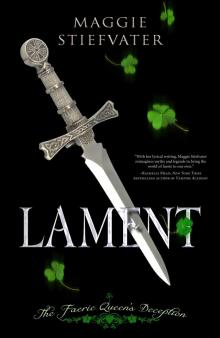 Lament: The Faerie Queens Deception
Lament: The Faerie Queens Deception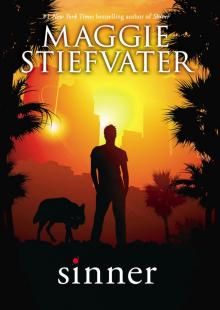 Sinner
Sinner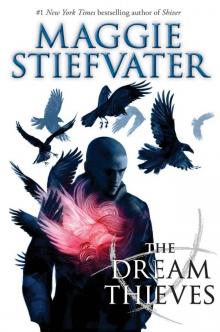 The Dream Thieves
The Dream Thieves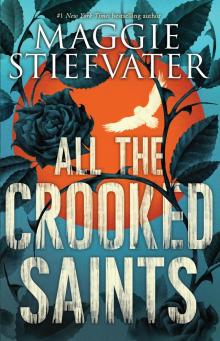 All the Crooked Saints
All the Crooked Saints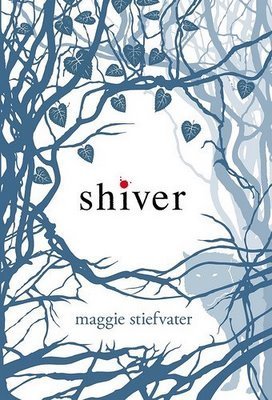 Shiver
Shiver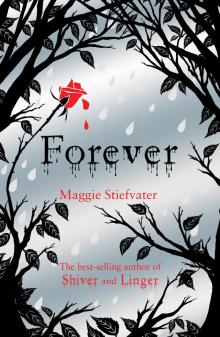 Forever
Forever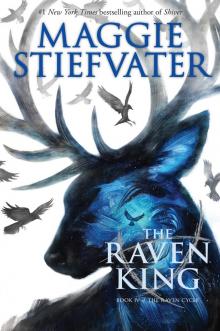 The Raven King
The Raven King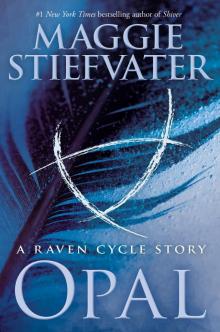 Opal
Opal Linger
Linger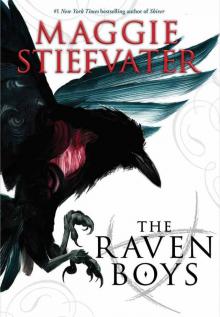 The Raven Boys
The Raven Boys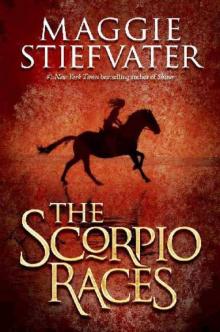 The Scorpio Races
The Scorpio Races Hunted
Hunted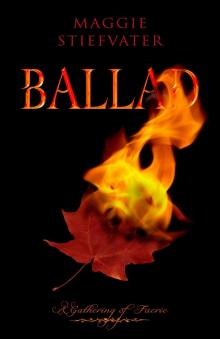 Ballad: A Gathering of Faerie
Ballad: A Gathering of Faerie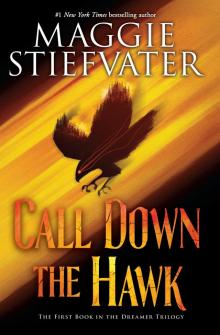 Call Down the Hawk
Call Down the Hawk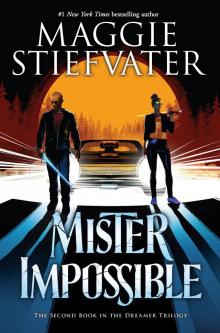 Mister Impossible
Mister Impossible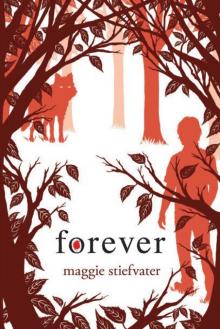 Wolves of Mercy Falls 03 - Forever
Wolves of Mercy Falls 03 - Forever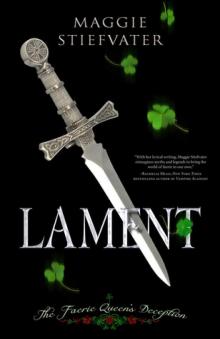 Lament
Lament![Maggie Stiefvater - [Wolves of Mercy Falls 02] Read online](http://i1.bookreadfree.com/i1/04/04/maggie_stiefvater_-_wolves_of_mercy_falls_02_preview.jpg) Maggie Stiefvater - [Wolves of Mercy Falls 02]
Maggie Stiefvater - [Wolves of Mercy Falls 02]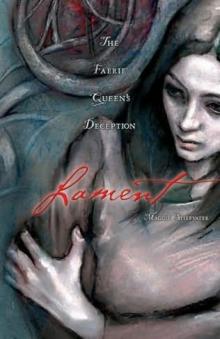 Lament: The Faerie Queen's Deception
Lament: The Faerie Queen's Deception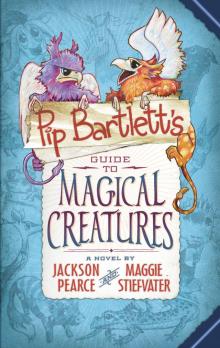 Pip Bartlett's Guide to Magical Creatures
Pip Bartlett's Guide to Magical Creatures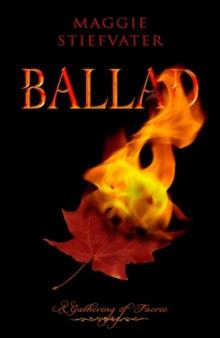 Ballad
Ballad